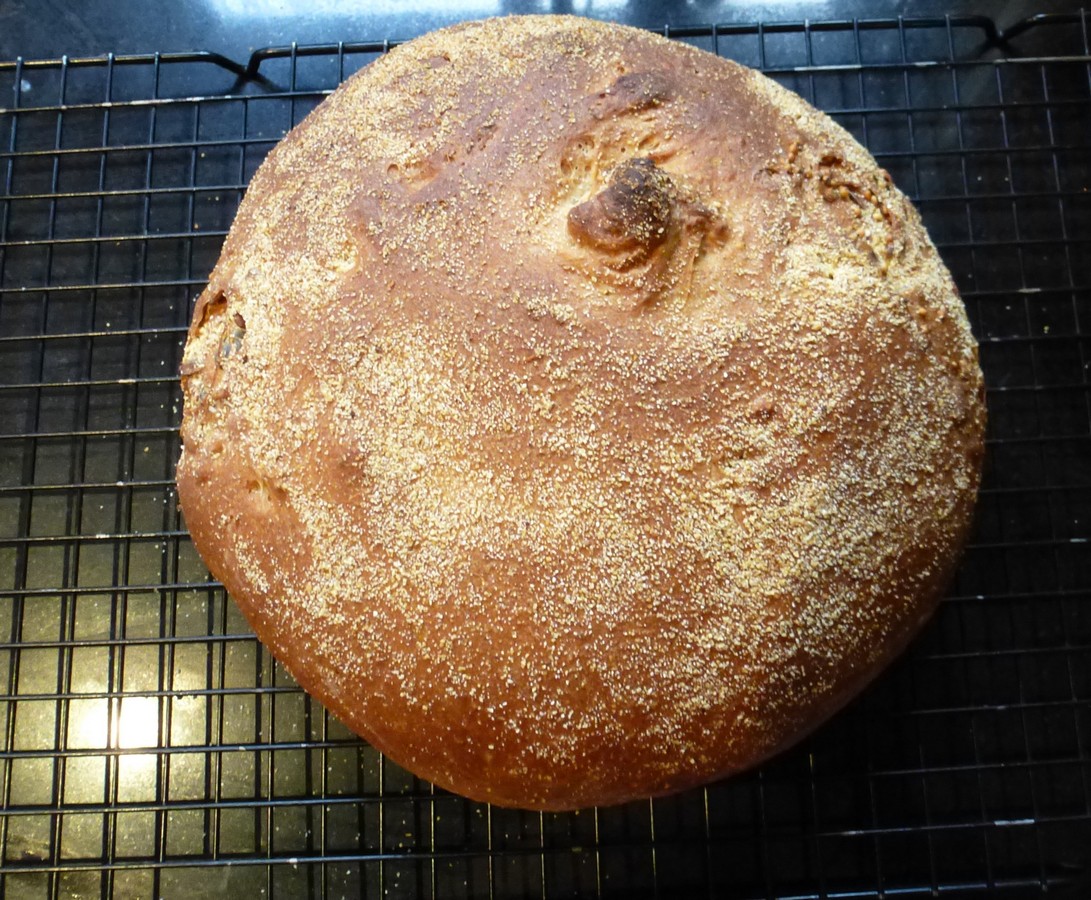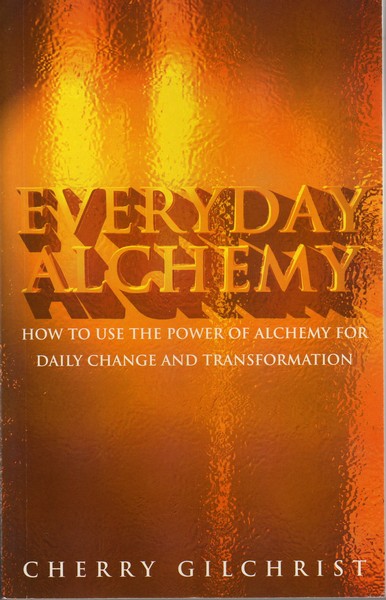Having acquired White Lead, do the work of women, that is: COOK

‘Do you cook supper sometimes? If so, you’re an alchemist.’ This usually produces a response of surprised delight, when I open a talk on alchemy this way. Many people are drawn to old alchemical imagery, as the psychologist Carl Jung pointed out, but the process and practice of alchemy through history can seem very obscure and mysterious. The aim of my first book on alchemy, Alchemy: The Great Work was to clarify its history and significance, and it has been in print now in one form or another for over thirty years. My second book Everyday Alchemy took a different approach and asked the question: how we can ‘make gold’ in our own lives? For this, I took a sequence of alchemical emblems from Michael Maier’s book Atlanta Fugiens, published in 1617, and suggested ways in which we can use alchemical knowledge to enrich and transform our personal experience. Cookery turned out to be a very useful way of doing this!
Like alchemy, it is both art and science – it requires attention and ingenuity, as well as knowledge and skill. Cookery is magical, creative and indeed unpredictable process as it endeavours to turn raw ingredients into an appealing and attractive finished dish. Who, after all, hasn’t lamented a culinary failure, or rejoiced over a stylish and delicious success?
So what I’ll do here is to weave some pictures into edited extracts from the book, along with an easy and delicious recipe to finish. In the current days of lockdown in Britain, many more people have turned to baking. It’s comforting and creative, and although there’s a shortage of some ingredients, you may often find that you have what you need in the cupboard if you pick a recipe that’s not too complex.


From Chapter Three of Everyday Alchemy
Cooking – Is it really Alchemy?
Strangely enough, cooking is a very good way to appreciate how alchemy works. It is one of the best examples of transformation that we have in everyday life. But it is not just a mechanical process – remember that no alchemy is complete without conscious participation. We need to give it attention, even when the work is repetitive. This way, the transformation can proceed at every level, not just in the saucepan.
But what is transformation itself? The word comes up again and again in alchemy, so I need to take a deep breath and try to penetrate its meaning. Here is an example; it is simple, and comes from the humble kitchen, but it is true alchemy.
A few weeks ago, I decided to make some bramble jelly. It was late summer, and the days were sunny and mellow. There is a patch of wild blackberries just over my garden wall, and I picked and ate them practically every day, often just stewing them up with apples. Then I wanted to do something different, to keep the flavour of summer berries in my store cupboard through the cold months of winter ahead. I followed the recipe by cooking the blackberries in water, then straining them overnight through a canvas jelly bag. The slow drip resulted in a litre or so of a clear, dark liquid, to which I added sugar and then boiled it up. The temperature of the heat is crucial; first it must be gentle, to dissolve the sugar without burning it, and then brought up so that it is high enough to reach the ‘setting point’, the temperature at which the jelly will set. Some jellies and jams will be ready in a few minutes, while others take up to three quarters of an hour. Recipes are only a guide: the cook must be very watchful, because it’s impossible to predict exactly how long it will take.

You must also pour it into warmed glass jars before it sets completely. If the jars are not warmed, they may crack. If the jelly is taken off the stove too soon, you’ll have a runny mixture, and if you leave it too long it will become too rubbery and the flavour will alter. Fortunately, in my case the result was a translucent jelly, of a beautiful dark ruby colour. The pots stand in my cupboard; the berry has been transformed into a new substance, but the jelly nevertheless retains the beauty of the blackberry, and the delicacy and tang of its taste. And this jelly can be kept for months, unlike the berry that rots so quickly on the bush.
Bramble jelly became my triumph of domestic alchemy, the ‘gold’ achieved from three simple ingredients – berries, water and sugar – and transformed through the agency of fire. The jelly contains the essence of blackberry. The berry has lost its original form, but through this sacrifice, its essence is released and is embodied in a new and purer form. In alchemy, the death of the ‘body’ must occur, which then liberates the soul and spirit; these in turn find a home in a new ‘glorified’ body.
It is extraordinary to think that the humble blackberry and jelly making can be seen in such mystical terms, but true transformation has taken place. Transformation is a change of state, a process by which the whole person or substance is changed.

A modern version of ‘cooking the trout’ mentioned in the emblem above – although such instructions were usually deeply symbolic, rather than literal. In fact I think this was a sea bream we were about to eat here.
True cookery is a creative process. Cooking transforms the ingredients, whereas food fixing, or assembling, on the other hand, simply combines them into – let’s say – a tuna mayo sandwich, or a prettily presented raw salad. With cooking, there is always an element of risk that something will go wrong – the mayonnaise will curdle or the cake sag. Science may say that results can be replicated if you start with exactly the same ingredients and work in exactly the same conditions. But when is this ever possible? Who can fully predict the final taste of wine that is being made? The variables, such as the weather conditions, the state of the soil and so on, can be assessed to some extent. But perhaps there is more to it than that. After all, no one grape is ever exactly the same as any other grape. No two people are identical. The very fact of existing at a different meeting point of time and space creates differences between people, plants, or raw materials. And this is not perceived as a simple causal effect, but is tied into the alchemical view that the cosmos itself has a conscious life.
‘This whole Cosmos…is full of Life. And there is nothing therein, through all Eternity, neither of the whole nor of its parts, which doth not live. For not a single thing that is, or has been, or shall be in this Cosmos, is dead.’
The Divine Pymander of Hermes Trismegistus
( From Chapter Three of Everyday Alchemy)

So, get to it, and enjoy your cooking forays! Here is an easy and super-delicious recipe from the Queen of Baking, Mary Berry, along with some notes I’ve made when cooking this. It’s comforting and simple. Remember – cooking is flexible and even though we might need to start off with exact recipes, there’s often scope for improvising. Bara Brith is a kind of Welsh tea-bread. But there are many versions of this recipe across the British Isles– in Ireland it’s known as Barm Brack. Bringing this even closer to alchemy, you might like to try an Irish Halloween Barm Brack, ‘complete with ring for love and a coin for wealth’. https://www.irishtimes.com/life-and-style/food-and-drink/recipes/the-perfect-traditional-irish-barmbrack-1.2842588.The essential part of the process for all these recipes seems to be soaking the dried fruit in tea for a few hours beforehand, or overnight. But the Irish twist in this recipe is to add a drop or two of whisky!

From ‘Mary Berry’s Baking Bible’
With notes by Cherry Gilchrist
Bara Brith (Speckled bread)
175g (6 oz) currants
175 g (6 oz) sultanas (Fruit could be varied – cranberries and raisins should work too)
225 g (8 oz) light muscovado sugar (Dark should be fine)
300 ml ( ½ pt) strong hot tea
275 g (10oz) self-raising flour (or add baking powder – soda in the USA – if you only have plain flour. I calculate this at scant 2 tsp)
1 large egg, beaten
(Option to add a little spice – eg 1 tsp mixed spice, or 2 tsp cinnamon and/or a little powdered ginger)
- Measure the fruit and sugar into a bowl, pour over the hot tea, cover and leave overnight. (If you make a big enough pot, this will give you an excuse to sit down with a strong cuppa afterwards.)
- Pre-heat the oven to 150 degrees C/ Fan 130C. Lightly grease a 900 g (2lb) loaf tin then line the base with baking parchment
- Stir the flour and egg into the fruit mixture, mix thoroughly, then turn into the prepared tin and level the surface.
- Bake in the pre-heated oven for about 1 ½ hours or until well risen and firm to the touch. (Don’t skimp on the timing. It will be moist whatever you do, just about, but if it comes out too early it may be ‘sad’ and a little heavy in the middle). A skewer inserted into the centre should come out clean. Leave to cool in the tin for 10 minutes then turn out, peel off the parchment and finish cooling on a wire rack. Serve sliced and buttered.
Related books by Cherry Gilchrist:


Alchemy: The Great Work (also published as The Elements of Alchemy and Explore Alchemy) This is a concise and accessible history of alchemy, and explains how alchemists attempted the process of transforming base matter into gold.
Everyday Alchemy (also published as The Alchemist’s Path) is a personal guide to using the process of alchemical change in everyday life. It is currently out of print, but used copies are normally available from internet sellers like Amazon or Abe Books. We hope to organise a reprint and/or e-book edition in due course.

Nice recipe! Worked well and very tasty too!
LikeLike